Travel to watch performances generates major benefits, tourism spinoffs
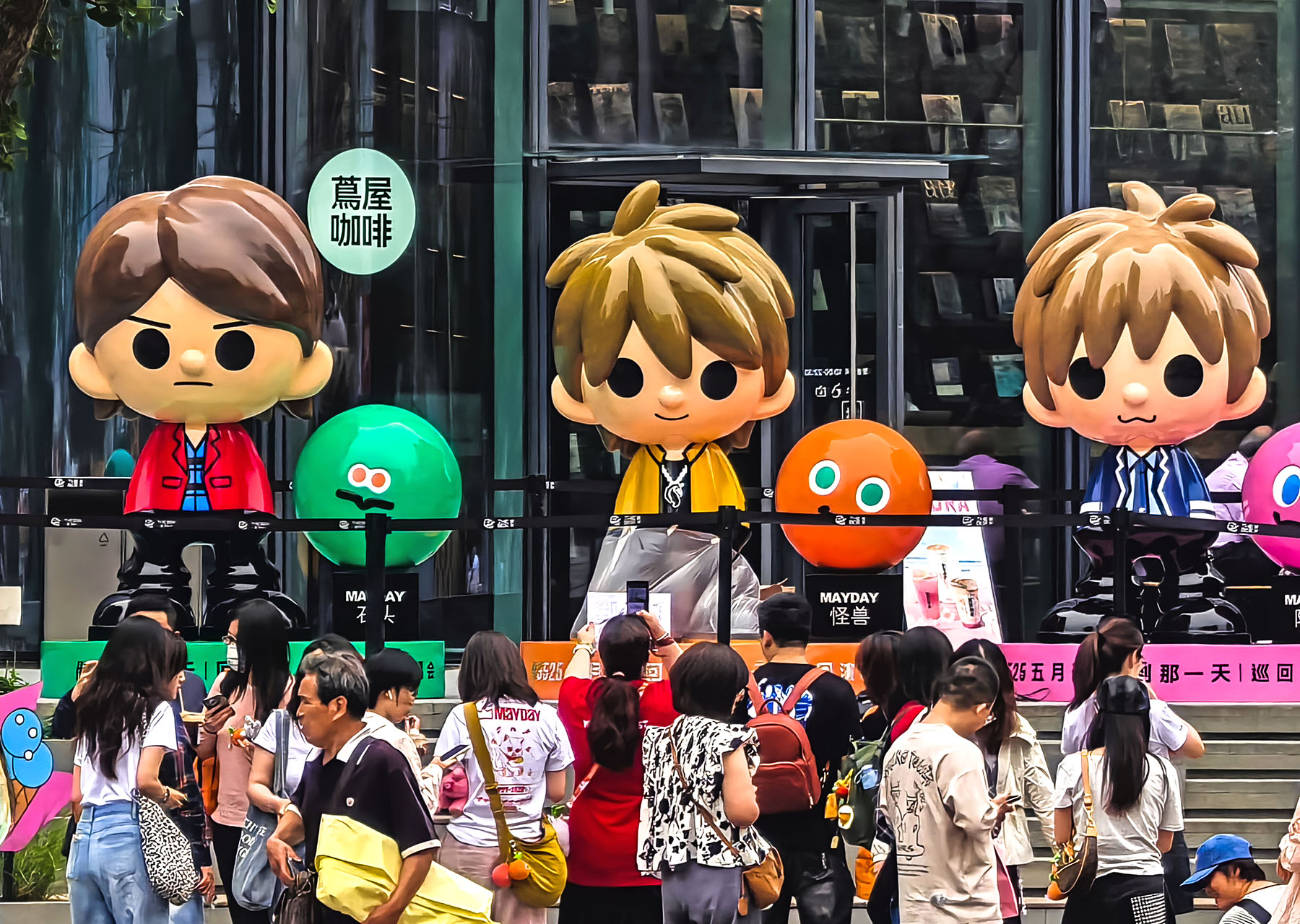
Chaoyang Park in Beijing has been lively lately. Five massive, 18-meter-high colorful spheres sit on the lake, drawing crowds of visitors eager to snap photos and check in on social media.
The spheres aren't random art — they're a special installation for fans of Taiwan rock band Mayday, ahead of their 12-concert run at the National Stadium, also known as the Bird's Nest, which starts on Friday. Each sphere represents one band member, and for many fans, it has become a must-visit spot.
Among those making the pilgrimage is Zhou Ying, a 32-year-old engineer in Shanghai. Earlier this month, she seized the opportunity to attend a friend's wedding in Beijing — and braved the city's sweltering 40 C heat to visit the park.
READ MORE: Boom in live performances echoes loudly across China
"I've been to Beijing many times, but this was my first time at Chaoyang Park — just to see the spheres," Zhou said. "It felt like a badge of honor."
For Zhou, who's followed Mayday for over a decade, their concerts are more than music. She was in the crowd when the band first played the Bird's Nest 13 years ago. She returned last year and has already secured tickets for two of their upcoming shows in August, when she will be back in Beijing.
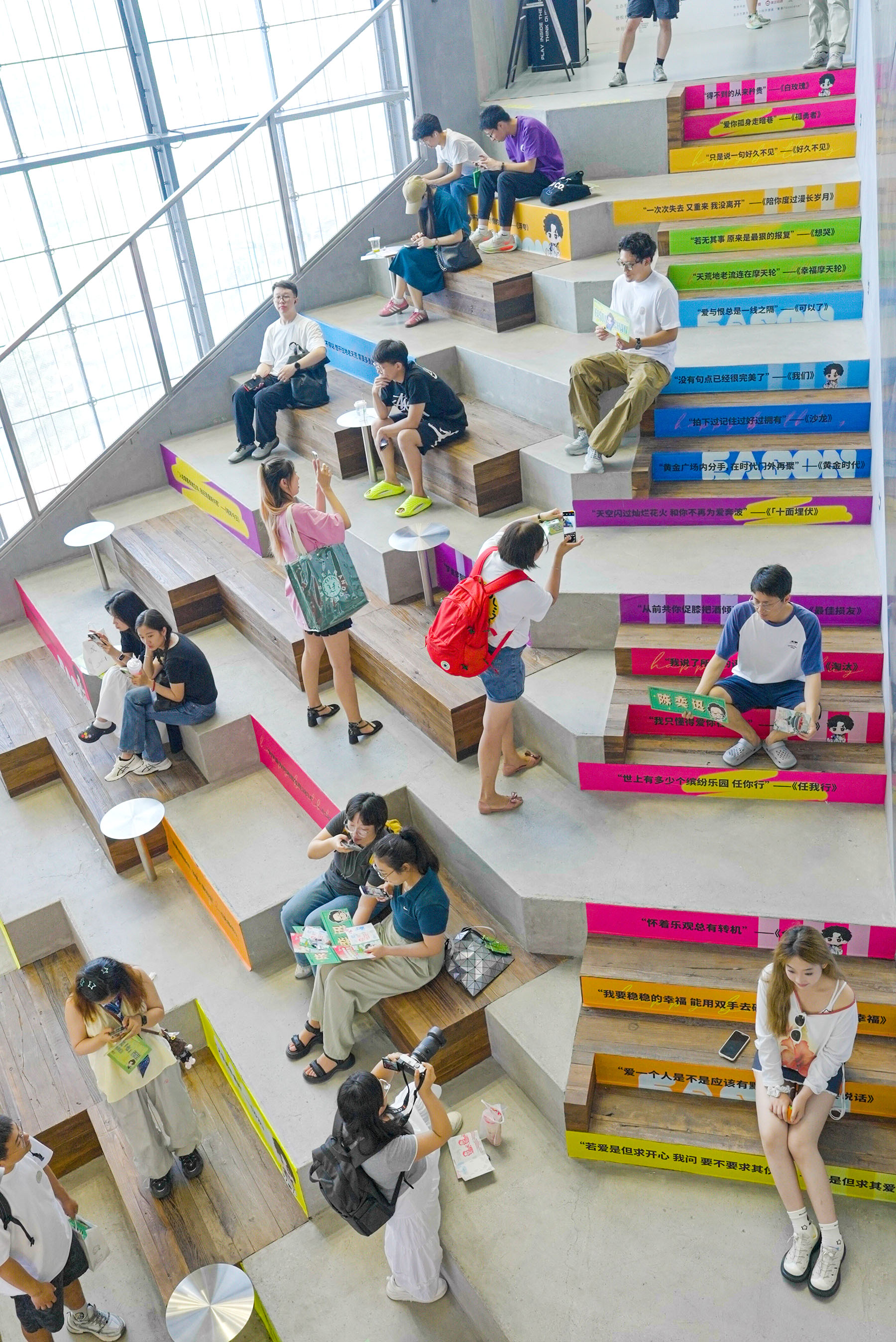
On this trip, she plans to visit other Mayday-themed installations around the city, including fan merchandise pop-ups and lifesize caricatures of them scattered at tourist sites and malls. "It's not just about the concert anymore," Zhou said. "It's about exploring the city in a way that's tied to something I love."
In recent years, turning a city into a "concert destination" has emerged as a key strategy for boosting urban consumption. It has evolved into a collaborative effort: local governments provide policy support, tourism bureaus create themed spots, while shopping malls, restaurants, and hotels roll out joint marketing campaigns, and airlines and online travel platforms launch exclusive fan packages.
The result is a layered tourism ecosystem that transforms a single night of music into an extended experience — and a new engine for city branding.
Zhou knows this firsthand. Over the past two years, she has followed Mayday's tour to Wuhan, Hubei province, Tianjin, Hangzhou, Zhejiang province, and Harbin, Heilongjiang province. Each stop was an opportunity for her to explore local culture and contribute to the city's tourism economy.
"I always make time to visit local attractions and try the food," she said. "It gives me a sense of how people live there."
Unlike most tourists, Zhou makes it a point to seek out Mayday-themed pop-up stores and installations unique to each city. "They're a little different every time, so I want to see them all," she said. "And you meet other fans from all over the country. It's like stepping into Mayday Land — it makes me so happy."
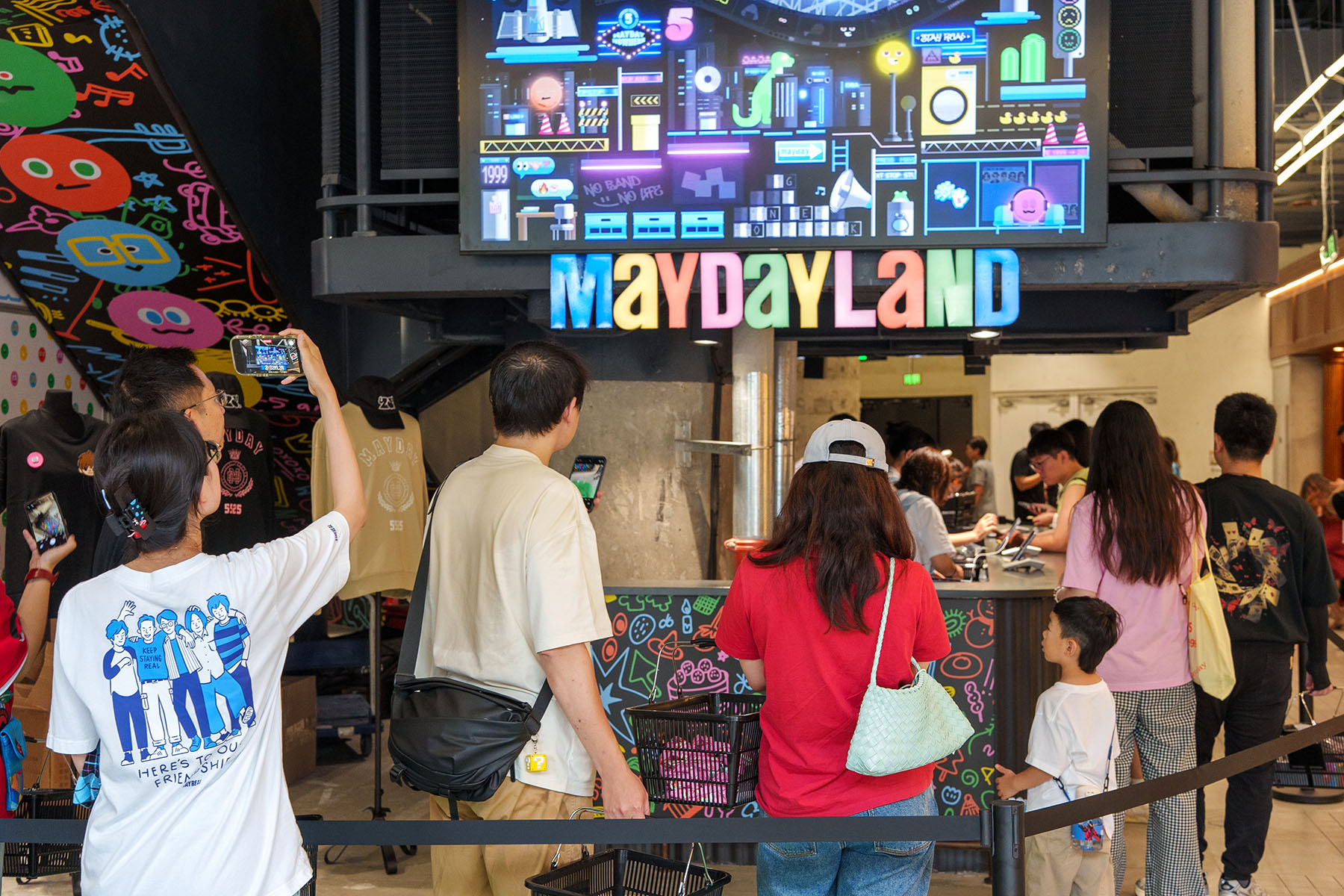
'Mayday Land'
The five towering spheres in Chaoyang Park have become a magnet for Mayday fans. Every evening, fans gather on the lake bank, armed with light sticks and flashing signs, turning the tranquil park into an impromptu fan zone where summer nights hum with music.
Visitor numbers at Chaoyang Park have surged by roughly 50 percent since the installations arrived, particularly on evenings and weekends, according to the park's deputy general manager Li Li. "It's not only fans," Li said. "Photographers and even samba dancers are coming, turning the area into a lively social space."
The park has responded by adding four food trucks and relocating its boat dock to give fans a clearer view of the installations.
Beijing's tourism authorities have also rolled out initiatives tied to the concerts. Life-size Mayday figures are scattered across Beijing landmarks, while sightseeing buses and boat tours take fans on "check-in" routes across the city.
A tiny flatbread shop near the Gulou area is also cashing in. Owner Li Feng said his customer base changed dramatically after Mayday's lead vocalist and songwriter Ashin posted about the shop on social media last year.
"Before, it was all locals. Now we get dozens of fans daily, and on weekends we get over 100," Li said. One fan even ordered 500 flatbreads to distribute as souvenirs.
Li's shopfront is now adorned with Mayday merchandise, and he has created a small space where fans can exchange memorabilia.
"They greet each other like old friends even though they come from different places and may never see each other again," Li said. "It's amazing how warm and supportive this community is."
Last month, Mayday's bassist, Masa, and drummer, Ming, stopped by for flatbreads. As the band prepares to return to the Bird's Nest, 46-year-old Li is ready for the influx.
'He also plans to attend a Mayday concert himself with his wife. "I wasn't a fan before," he admitted. "But now I am."
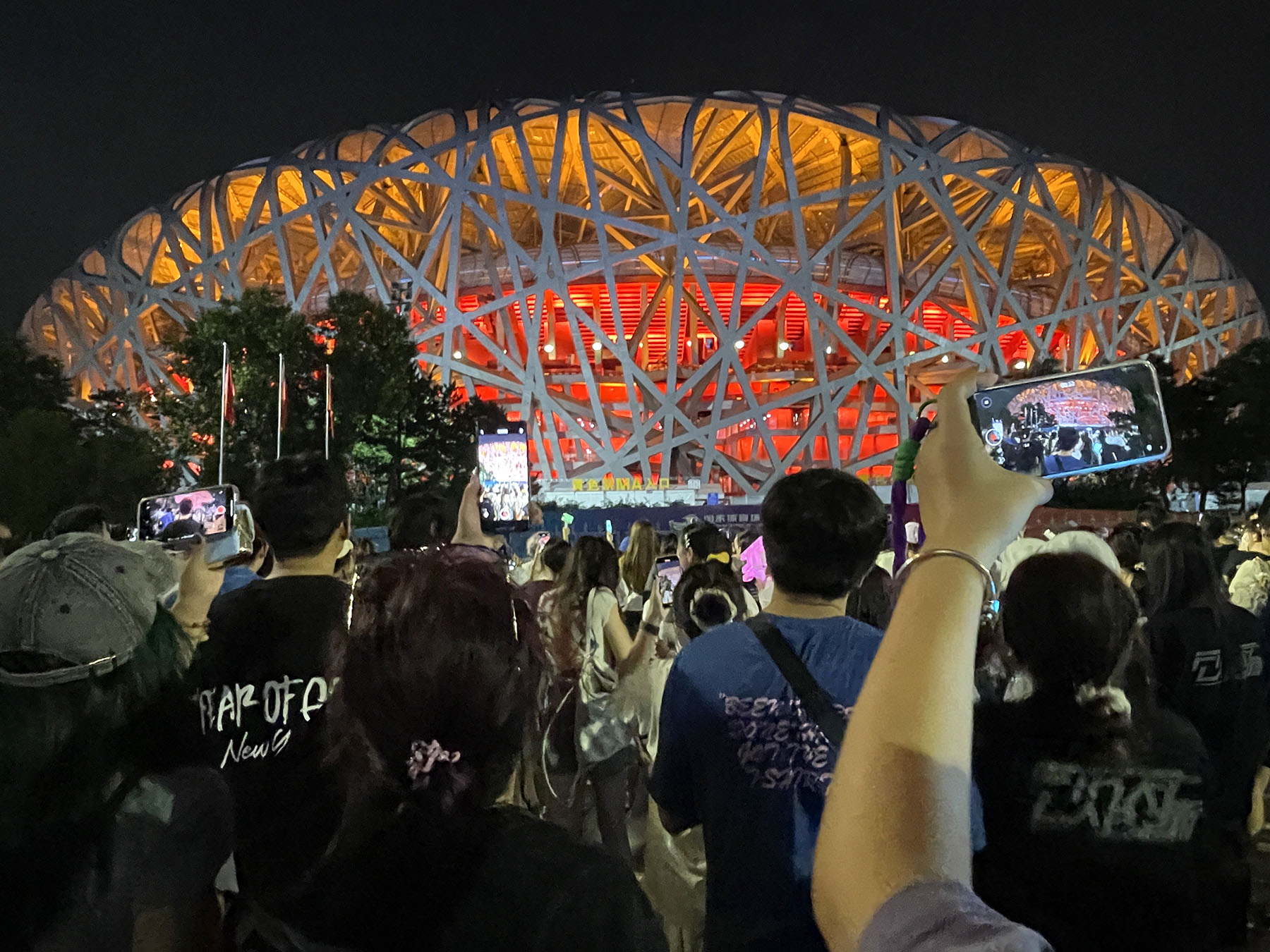
Fan playground
Beijing's concert scene is heating up this July as major artists take the stage, drawing fans and energizing businesses across the city. Besides Mayday, performers including Eason Chan, JJ Lin, Richie Jen, Chen Li, and Mao Buyi are attracting large audiences and boosting local commerce.
At Raffles City Beijing in Dongzhimen, a staircase featuring JJ Lin's song lyrics has become a popular spot for fans to gather and take photos. The venue has also added photo booths, capsule toy machines, and a coffee cart to enhance fan engagement.
At restaurant chain Xiao Diao Li Tang's branch near the Bird's Nest, a life-size cutout of JJ Lin is placed at the entrance. Staff members wear purple T-shirts matching the color favored by the singer's fans, and sport themed face stickers.
Store manager Zhao Chunwei said his team researched fan groups before the concert season. "Every fan group has its own name and culture, so we make sure to understand them before big events," Zhao said.
Since JJ Lin began his shows at the Bird's Nest, the shop has experienced a 22 percent increase in weekend sales compared with typical weekends. Zhao noted that many customers are JJ Lin fans, some arriving directly from airports or train stations with luggage in tow.
Eason Chan's concert series has also prompted a variety of fan activities at The Box, a lifestyle complex in Beijing's Chaowai UIC district. The complex features a 5-meter-tall inflatable figure of Eason Chan and displays official concert posters on large and small screens throughout the plaza.
Fans can collect free banners and hand-drawn postcards of Beijing landmarks, while a bakery inside The Box B Hall offers themed blind boxes.
"Concerts have become social currency for today's younger generation," said Zhai Zhihao, project manager for the Chaowai UIC district. "We're working with organizers to make the area a hub for fan communities."
Designed for consumers aged 15 to 29, The Box B combines art, culture, leisure, fitness, and social spaces. Zhai said the district plans to launch a series of events over the next month, including celebrity pop-up shops, virtual reality experiences, fan meet-and-greets, and interactive installations to create a "Summer Fans' Land".
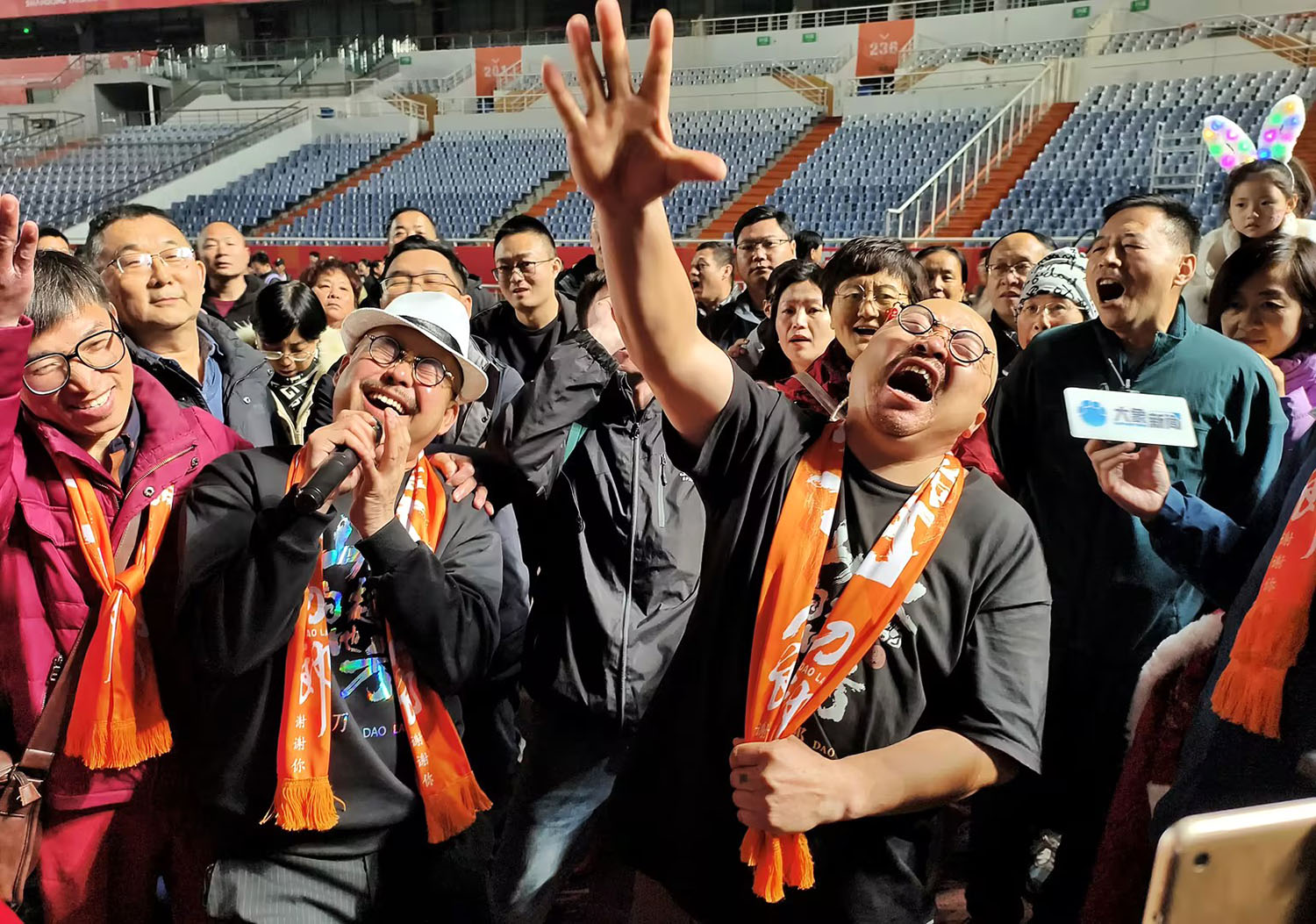
But wait, there's more
Concert tickets in Beijing also offer fans discounts on dining, attractions, and accommodation stays, while domestic airlines provide special deals for them to fly to concerts.
Hotel promotional packages include bus shuttle services to venues like the Bird's Nest.
The Four Seasons Hotel Beijing is offering Mayday fans complimentary breakfast for two, and 30 percent off meals when booking rooms at standard rates with concert tickets.
Ginny Jin Lin Khaw, the hotel's commercial director, said the promotion is a response to strong demand from young, affluent fans traveling to cities for concerts.
"We aim to provide comfortable experiences while capturing peak demand and expanding brand awareness," Khaw said.
Some rooms overlook the five spheres in Chaoyang Park, and the hotel is within walking distance of large caricature figures of the band members — making it easy for fans to complete their sightseeing and fandom itinerary.
Khaw has noticed increased bookings and social media engagement from fans seeking details since the offer was launched.
"This is our first attempt. We used the Mayday concerts as a pilot because of their large fan base and strong demand for quality experiences," she said. "We hope to gain experience and prepare for future partnerships with major events and create a broader customer base."
Large-scale concerts have already brought economic benefits to Chaoyang district. A Culture and Tourism Bureau official said the area hosted 82 events last year with over 5,000 attendees for each, generating 1.61 billion yuan ($224.43 million) in box office revenue.
This year, event schedules at the Bird's Nest, National Indoor Stadium, and National Speed Skating Oval are nearly full, with talks underway for next year.
"Concerts are no longer just one-night events," the official explained. The district has organized smaller performances, park activities, and museum tours to enrich visitors' experiences in Beijing, while managing crowd flows and meeting different visitor needs.
Several supportive policies have been launched in Chaoyang district to further promote integration and expanded consumption across the culture, commerce, tourism, and sports sectors, she added. "These policies cover large concerts, music festivals, exhibitions, major sports events, and more," the official said.

Nationwide trend
The concert travel trend is not restricted to Beijing and is breathing new economic life into cities nationwide.
In March last year, Jay Chou's concerts in Sanya attracted 127,400 attendees over three days, with 82 percent coming from outside Hainan Island, according to the Sanya Tourism, Culture, Radio, Television and Sports Bureau. At the same time, Daolang's concerts in Wuhan saw hotel bookings near Wuhan Sports Center surge 550 percent, data from online travel agency Ctrip showed.
In Suzhou, Jiangsu province, JJ Lin's shows generated more than 700 million yuan in additional consumption, with over half attributed to fans traveling from other cities, according to the Suzhou Olympic Sports Centre.
"A single concert ticket can drive 4.5 to 5 times its value in related spending," said Zhang Haijun, president of the Beijing Performing Arts and Entertainment association. "As cross-city concertgoing becomes part of people's cultural lifestyle, the economic value of a ticket far exceeds its face price."
After the shows, the energy lingers in late-night eateries and shopping districts, sustaining momentum long after the music stops, Zhang noted.
Suzhou this year introduced financial incentives for organizers. Concerts or festivals drawing over 50,000 attendees receive subsidies of 15 yuan per ticket, rising to 20 yuan for audiences exceeding 100,000.
ALSO READ: Outdoor music festivals ready to rock again
In Jinan, Shandong province, authorities launched the "Travel with Daolang" campaign to coincide with the singer-songwriter's shows earlier this year that included discounted or free admission to major tourist attractions. After one show was sold out, they opened a nearby stadium to accommodate up to 70,000 fans, offering them free porridge and hot water to keep warm.
Hangzhou recently launched the second phase of its "2025 Concert Tourism in Hangzhou" initiative. Fans purchasing tickets via platforms such as Damai can enjoy bundled cultural tourism packages, including discounts at scenic spots and hotels, valid three days before and after their concert.
For Zhou, the Mayday fan, her fan journey stretches across months and cities. She has already planned her calendar and travel plans around Mayday's following concert dates. "Almost all my vacations are tied to concerts," she said.
Each concert trip has its own rhythm — a mix of anticipation, music, and exploration, she said.
"Maybe I can't go to every city," she said, "but each one I visit leaves me with a unique memory. And sometimes, I get to share it with fellow Mayday fans on the road."
Contact the writer at liyingxue@chinadaily.com.cn


